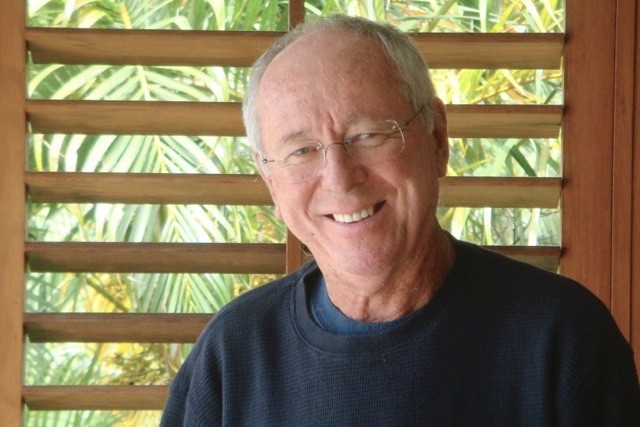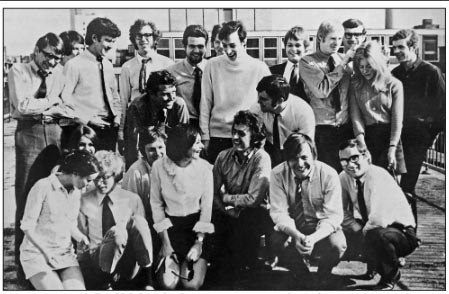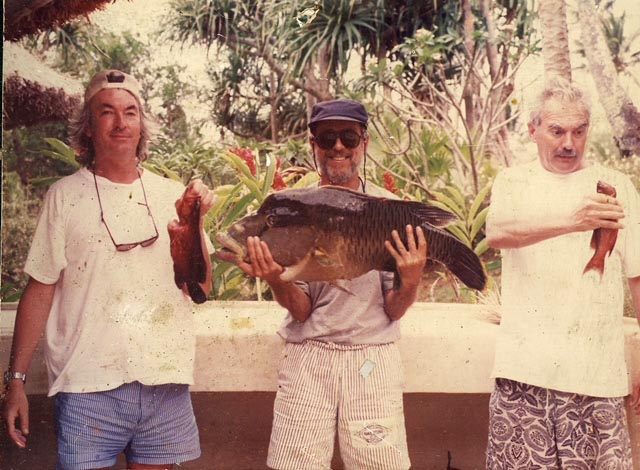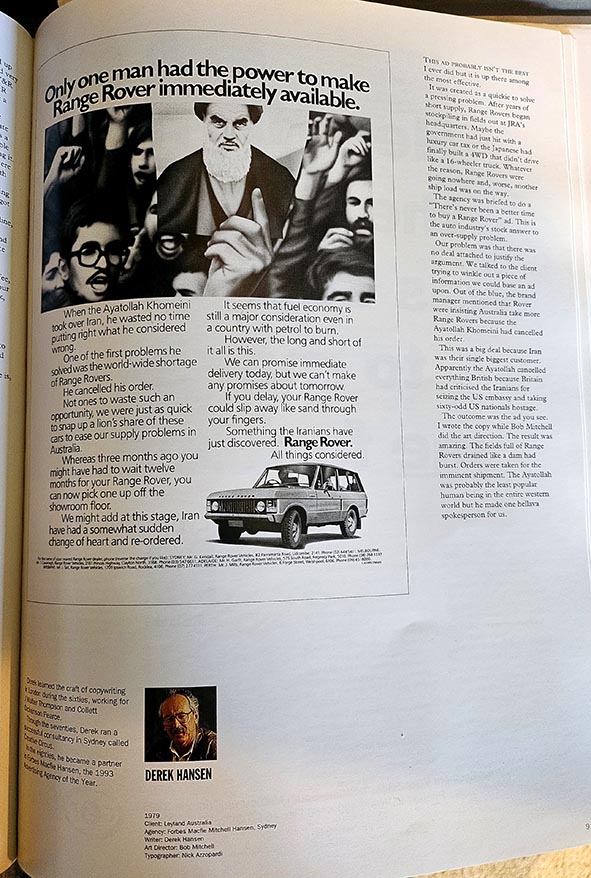Vale Derek Hansen: two great creative writing careers in one extraordinary lifetime

The advertising and literary community has lost one of its legends, with the passing of successful novelist and short story writer, and former, equally successful, advertising creative director Derek Hansen earlier this week, aged 80.
Before becoming a successful writer of novels, Hansen, born in England, raised in New Zealand, had a long and successful career in advertising, including at the legendary Collett Dickenson Pearce in London in the 60s. Hansen was part of the greatest generation at CDP, working alongside Alan Parker, John Salmon, Charles Saatchi, Alan Tilby, Ron Collins and Gray Joliffe, amongst many others.
On this career in London, Hansen wrote to Mike Doyle in 2021: “I arrived in London from New Zealand with little previous copywriting experience and a totally unjustified sense of optimism and confidence. I told the right lies and got hired by Nelson Advertising, a subsidiary of Benton and Bowles, which had the Jaguar account and not much else. I worked on the not much else.
“I found copywriting in England easier than In New Zealand because I was raised on BBC humour. I did well enough to be able to move on to Maxwell Clarke, a totally crap agency that had had some good people move through it. I took Alan Parker’s place when he moved on to CDP (Alan took Len Weinright’s place) and worked with Gray Joliffe as my art director.
“When he moved on to CDP as well I thought it was time to abandon ship. I wound up in JWT because they had just appointed a new Group Head, Nick Salaman, who was looking for someone left field to stir the pot. And stir the pot I did. I broke rules, solicited work from other groups, generally got a reputation for being aggressive, wrote a commercial that won the top award at D&AD which the agency had previously rejected twice. If I hadn’t been a mate of the Canadian guy who ran marketing at Alcan the tvc would never have seen the light of day.
“I had an appointment at Colletts only to discover that another group from JWT had fronted them with my work. I don’t think Collin Millward actually took to me. He sent me away with an appointment to come back and checked me out with Grey Jolliffe and Alan Parker. I went back and met John Salmon who took a liking to me and suddenly I was in.
“I found it a strange place to work with other teams competing for work which I’d been given so I just started walking into their offices, looking at what they were doing and returned the favour. They stopped coming into my office. I worked with Ron Collins. I was an outcast until everyone discovered I’d written the Alcan tvc which had blown their candidates out of the water. There was resentment but at last a degree of respect.
“Ron and I did an ad for GEC radios which won a Golden Circle Award. I was settling in when I got a job offer from FCB, Melbourne who’d just hired CDP art director Chris Burgess. It was winter, I was cold and it was an offer I couldn’t refuse. Probably not the best decision I ever made. John Salmon virtually doubled my salary to get me to stay and in hindsight I should have. CDP was a wonderful creative oasis but with poor social skills.”
On this career after returning from London, Hansen wrote to Mike Doyle in 2021: “I was hired in 1968 by the Melbourne office of FCB where I wound up CD of both Melbourne and Adelaide offices. I moved to Sydney two years later to Leo Burnett and got fired. It was a horrible place to work and I made no secret of that.
“Pritchard Wood picked me up and I was given free rein to write new and different stuff. Won quite a few international awards and picked a fair amount of new business. Unfortunately management changed and so I branched out with my own consultancy, Creative Circus. One of my agency clients was voted second most creative agency in Australia after The Campaign Palace. This agency, Jacka Advertising, employed 5 people and Creative Circus was their creative department.
“I got sick, realised I needed a little more substance to my career and accepted the invitation to help set up The Campaign Palace in Sydney with Gordon Trembath. Sounds like a dream job but for various reasons it was anything but.
“Forbes Macfie Mitchell invited me to join them as a 4th partner but in reality to replace Bob Mitchell who was the then Creative Director. We won a few awards, gained a lot of business and in 1983 were voted Agency of the Year by B&T. We prospered but I was in serious conflict with my partners. Nine years after joining them we sold out to FCB, which then bought Mojo, a place I never wanted to work, and had none of the political skills needed to survive there. It cost them to get rid of me and went home to write novels.
“They rang me about a month later to say my campaign done for FCB had won the Indonesia Tourist account and could I come back. On top of the year’s salary I got to walk off into the sunset, I cost them a thousand bucks a day over four months to make the press ads and commercials and tour all through the Indonesian archipelago. After that I was happy to write books, advertising career over, job done.”
Hansen’s first novel, Lunch With The Generals, published in 1993, was an immediate bestseller and provided all the encouragement he needed to continue. His books have been published in the UK, Europe and the USA. Hansen was the author of eight novels and three collections of short stories.
Asked when was the moment he thought he could be a published writer by fellow advertising creative director Ian MacTavish in 2016, Hansen replied: “Interesting. I always wanted to write a novel and always thought I could but it wasn’t until [fellow advertising creative director] Bryce Courtenay’s book The Power of One was published that I realised I could get published. I mean, if Bryce could do it… Call it rivalry, envy or pure jealousy, whatever it was it worked.”

The legendary CDP creative department circa 1967, which included Hansen (standing, fourth from left).
Ad legend Lionel Hunt pays tribute to his old friend:
Derek Hansen was one of the trio – Carey, Courtenay, Hansen, that went from being brilliant copywriters to world famous authors.
I never knew how they did it – I was focusing on thirty seconds or a full page and they were able to write hundreds of clever pages.
Bryce once said to me, ‘You should write a book’.
I said, ‘why?’
Derek was much more than a twice blessed writer.
He was a real trooper.
6 weeks after a kidney transplant (from his brother) I invited him to come marlin fishing on the Great Barrier Reef with me.
He checked with his doctor, got the ok, and came.
And got amongst the action.
Later he ran in the transplant marathon in Athens. (Fortunately I wasn’t eligible.)
He was a very good fisherman.
I fished with him many times over the years, but most recently he and I fished on my boat every week on Pittwater and off Palm Beach.
I had all the latest, expensive, high-tech gear and Derek had his old, reliable cheapstuff from 20 years ago.
Of course he outfished me two to one.
He was an excellent chef, mainly seafood of course, as was his wife Carol, with delicious deserts.
Condolences to Carole, C.T. and Lana.
Miss you already Derek.

Out fished in Fiji: ad pals and mad fishermen Lionel Hunt, Derek Hansen and Neil Shennen

Derek Hansen picked this highly effective Range Rover ad, created at Forbes Macfie Hansen in 1979, as his favourite ad in Campaign Brief’s Millennium Book, published in 2000.

6 Comments
Sad to hear. I worked under Derek at FCB, he was a good man and had many games of snooker at his place in Clareville. Another great one gone.
Very sorry to hear of Derek’s passing.
I met Derek at FCB Melbourne in 1969, during my early years as an art director.
A great talent, passionate about his work and of generous personality.
Often he would tell stories relating to his previous role at Collett Dickenson Pearce in London.
I found this intriguing to the point that within months I’d resigned and booked a flight to London.
Derek gave me heaps of encouragement and futhermore supplied me with names and references for people I should contact which opened normally inaccessible doors and helped leverage me getting a job at CDP.
His generosity was a great catalyst to my career and to say I’m grateful is an understatement.
Gone but not forgotten.
Derek was in the CDP generation before me, but I first met him in the early 1980s when I moved to Australia and lived on Bilgola Plateau. I met him at a book signing at Bookocino in Avalon and bought a copy of ‘Lunch with Mussolini.’ The dust jacket was ripped, and he insisted on returning home to get a ‘clean’ copy. I visited him a couple of years ago to give him a copy of my first book of memoirs, ‘A Sinner’s Tales of the Second Oldest Profession’. He sent me these kind comments:
Hi Mike, your book is very impressive, but most impressive of all are the ads you did. Your book mostly concerns times post-1968 and I returned to Australia in June of that year. Of course, I know all the names, but I met a few socially. Just Gray Jolliffe, Alan Parker and Ron Collins for tennis. Gray sometimes came for dinner. Now I look at your ads and wonder what I would have done had I remained in London. I’ve won several awards for press and magazine ads, including one with Ron Collins, but my strength was always TV and radio. Funnily enough, I enjoyed press ads more because I loved writing the copy, re-writing the copy and toying with options. That’s why your work really appeals to me, the thought that went into it and the excellent execution. Well done. However, I imagine you found it very hard to adjust to Australian advertising. I had a hard enough time, and I was brought up in NZ. Your ads are so very English and the product of having time to do things properly. Your work really got me rather wistfully thinking about what I might have done had I stayed at CDP for another couple of years.
He was a very generous man, giving me a copy of his book ‘Remember Me.’ He not only helped Rob Henderson get into CDP (where he was teamed up with me) but also helped Paul Fonteyne get hired in Australia. Long may he rest in peace and condolences to Carol.
Derek employed me in 1967/8 as his creative secretary at FCB. I was 17 and had just left the PMG Govt dept, as a stenographer. I had no idea what a “creative” secretary was, let alone an ad agency! Derek took great delight for years, in regaling the story of my turning up for my interview in a flowery flannelette type frock , with a fine ladder winding up the the back of my thick stockinged leg..I’d tried so hard! And there was Derek with a mass of unruly curls, Mr magoo glasses from memory, very casual and very different from the yellow shirt brigade at the Post Office!. The years that followed were an absolute delight – we did great work- Derek was a perfectionist – and (mostly) the corridors were filled with laughter. He truly was one of the great characters of our industry.
55 years on we were best buddies to the very end.. the memories won’t fade because I am also a very best buddy of Carole..Caz – you should be very proud! I sure am! ? RIP my friend.
Derek was one of the few copywriters I saw as a true wordsmiths.
Too much a gentleman for the cut and thrust a of being a full on madman, it didn’t surprise me to see him graduate to career novelist.
A huge loss. My condolences to Carole, who, through Derek, I was also very fortunate to know .
What a wonderful tribute to a genuinely lovely and talented man. I was fortunate to work with Derek when he was running Creative Circus, I was working for Rod Phillips, who knew Derek well. Being of the same vintage Derek and I both enjoyed swapping anecdotes and LP’s of BBC shows. The classic Tony Hancock ‘Blood Donor’ gave us both much joy. Visualising Hancock’s empty arm flopping around at the thought of him giving blood, and wanting a cup of tea a biscuit & a lie down after just the pin prick blood test.
A brilliant talent, amongst so many others, a genuinely golden era in the industry. Privileged to have known Derek for a time.
Vale.